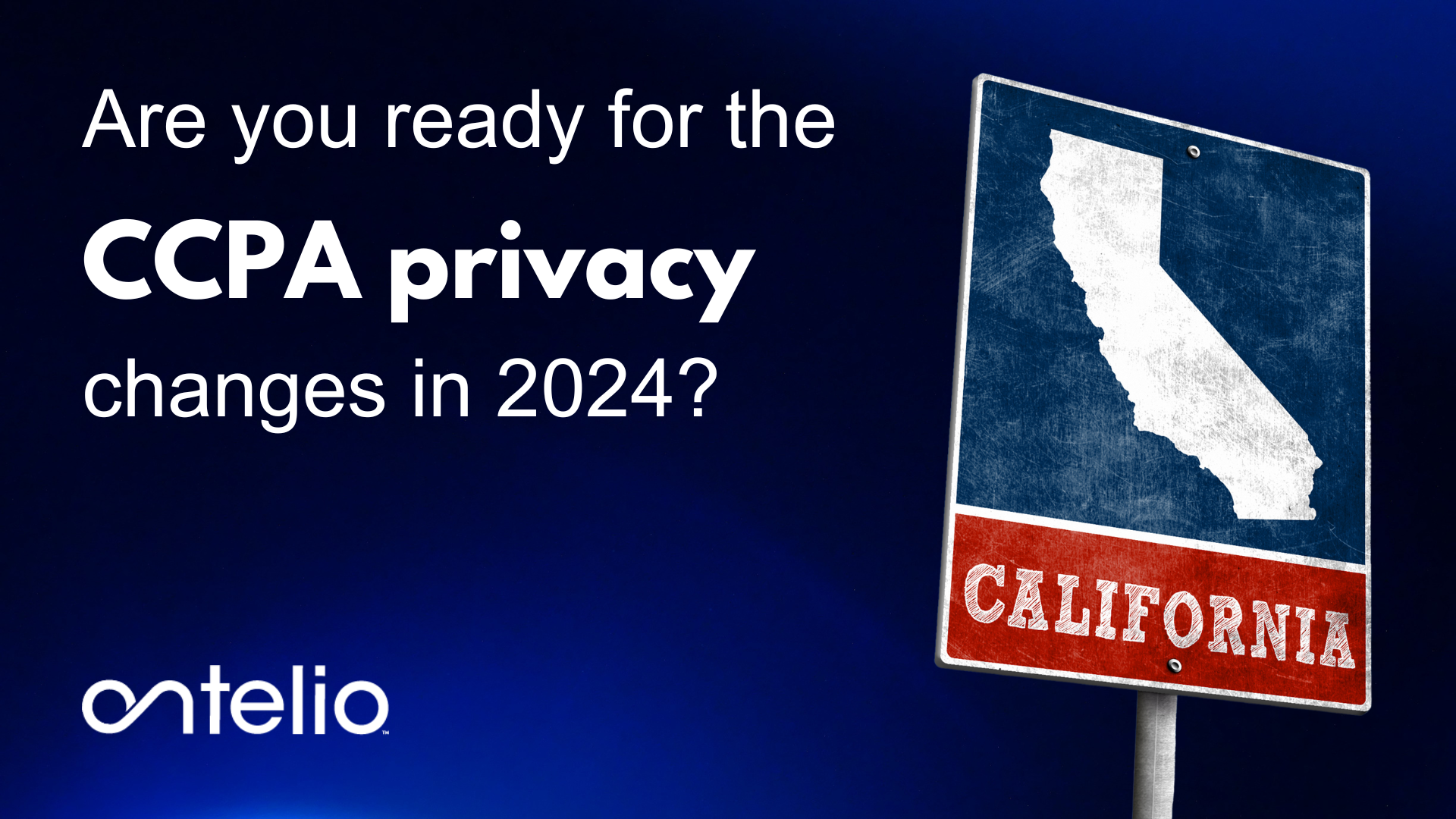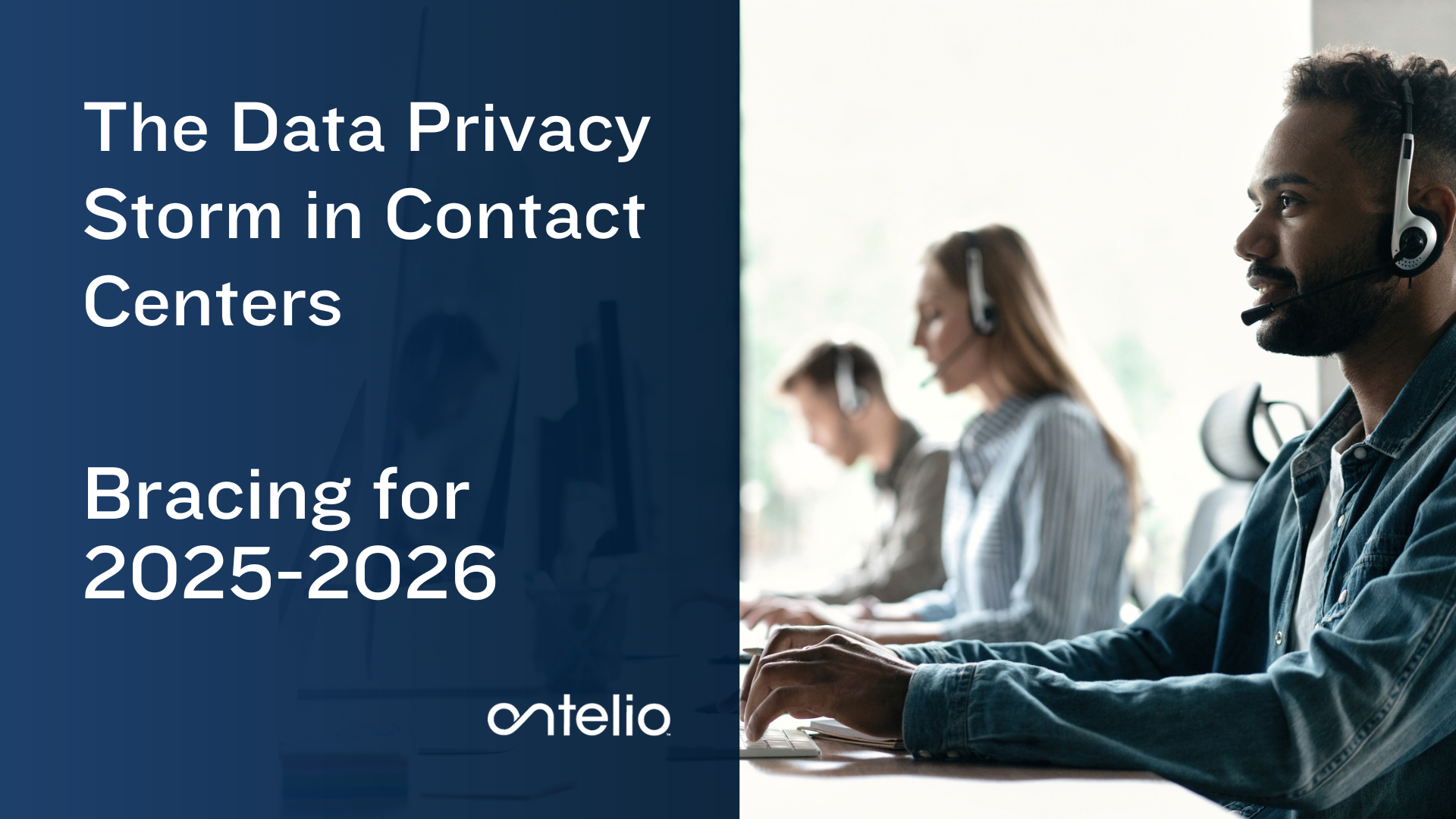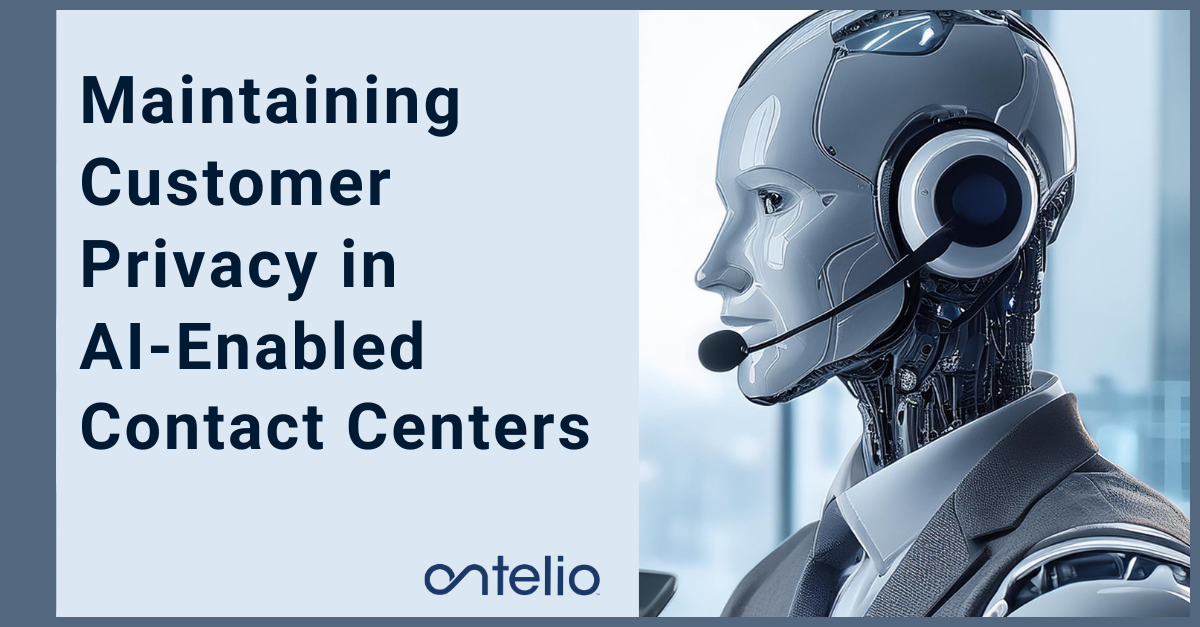1 min read
The Data Privacy Storm: Bracing for 2025-2026 in Contact Centers
The Federal Trade Commission's (FTC) intensifying scrutiny under its expanded 'unfairness' doctrine poses a pivotal challenge for Chief...
8 min read
Victoria Kingsley Jul 29, 2024 8:54:08 AM

In an era where data privacy has become a cornerstone of customer trust, the California Consumer Privacy Act (CCPA) presents both a challenge and an opportunity for businesses, particularly for large-scale contact centers. With the recent amendments, the CCPA has significantly upped the ante in terms of privacy standards and compliance requirements. These changes reflect a broader trend towards more rigorous data protection regulations globally, placing an increased burden on companies to safeguard consumer information diligently.
For contact centers, where customer interactions are rich with personal data, these new regulations underscore the need for robust data privacy practices. The introduction of post-call redaction technology emerges as a pivotal solution in this context. This innovative technology addresses a critical gap in traditional data protection methods, offering a proactive approach to safeguarding customer information discussed during calls. It not only helps in complying with the stringent CCPA mandates but also serves as a testament to a company's commitment to customer privacy.
However, the journey to full CCPA compliance is fraught with challenges. It demands a comprehensive understanding of the amendments, a strategic approach to data management, and the integration of advanced technologies like post-call redaction. This blog post aims to explore how businesses, especially large contact centers, can navigate these challenges. We will delve into the nuances of the amended CCPA regulations, the indispensable role of post-call redaction in ensuring compliance, and the broader strategies that companies need to adopt to align with these new legal requirements.
As contact centers evolve in this new regulatory landscape, understanding and implementing these changes is not just about legal compliance; it’s about redefining the way customer data is handled and protected. It's about building and maintaining a trust-based relationship with customers in an increasingly privacy-conscious world. This blog post is an essential read for CIOs, CISOs, and Privacy Officers who are at the forefront of steering their organizations through the complexities of CCPA compliance, ensuring not only adherence to legal standards but also upholding the highest levels of customer trust and data security.
In essence, the amended CCPA regulations present a pivotal moment for contact centers. This moment demands a shift in perspective - viewing compliance not as a regulatory burden but as an opportunity to enhance customer trust and corporate responsibility. The adoption of technologies like post-call redaction is a step forward in this journey, signifying a proactive stance towards privacy. It's a commitment to safeguarding the personal data that customers entrust to businesses during their interactions.
The CCPA, with its 2024 amendments, represents a significant evolution in the landscape of data privacy law, especially for businesses like contact centers that handle a large volume of personal data. These amendments have been introduced to address the challenges posed by the rapid advancement of technology and the increasing volume of data businesses collect and process. The key aspects of these amendments include:
Privacy Risk Assessments: Under the new regulations, businesses are required to conduct detailed assessments of the risks associated with their data processing activities. This means evaluating the types of personal information collected, understanding how this data is used, and identifying potential risks to consumer privacy. The assessment process should involve a systematic review of all data processing operations, identifying areas where consumer data could be at risk of unauthorized access or misuse. This proactive approach ensures that businesses are not only compliant with the CCPA but also actively working to safeguard consumer privacy.
Cybersecurity Audits: The amendments introduce mandatory cybersecurity audits for certain businesses, particularly those with significant revenue streams from selling or sharing personal information. These audits are designed to assess the effectiveness of a company's cybersecurity measures and identify any vulnerabilities in their systems. The goal is to ensure that businesses have robust security protocols in place to protect consumer data from cyber threats such as hacking, phishing, and other forms of cyberattacks. The audit process involves an in-depth examination of the company's IT infrastructure, data protection policies, and incident response plans.
AI and Automated Decision-Making Regulations: With the increasing use of AI and automated decision-making processes in business operations, the CCPA amendments focus on enhancing transparency and accountability in these areas. Businesses are now required to disclose their use of AI and automated systems, explaining how these technologies impact consumer data and decision-making processes. This includes providing clear information about the logic involved, the significance of the processes, and the potential consequences for consumers. The aim is to ensure that automated processes are fair, transparent, and do not infringe on consumer rights.
Stricter Rules for Service Providers and Contractors: The new CCPA rules extend the accountability for data protection to all third parties involved in processing personal data, including service providers and contractors. This means that businesses must ensure that their partners and vendors are also in compliance with CCPA standards. Contracts with third parties should include clauses that mandate adherence to data privacy standards, regular audits, and immediate reporting of any data breaches. This comprehensive approach ensures a unified standard of data protection throughout the entire data processing and handling chain.
These amendments reflect a growing recognition of the importance of data privacy and security in the digital age. For contact centers and other businesses handling significant amounts of personal data, understanding and complying with these new regulations is crucial for legal compliance and for maintaining consumer trust.
In the context of the amended CCPA, post-call redaction technology is not just a tool, but a vital component in ensuring compliance and securing customer trust. This technology goes beyond traditional data protection methods by actively identifying and eliminating sensitive information from call recordings, a common data source in contact centers. Here’s an expanded look at its role:
Enhancing Data Privacy: Post-call redaction technology operates by scanning call recordings for sensitive data such as credit card numbers, social security numbers, and personal health information. Once identified, this information is either deleted or masked to prevent unauthorized access. This process is crucial in a scenario where call agents might inadvertently collect more information than necessary, or where customers share sensitive data without being prompted. By automating the redaction process, businesses ensure that no sensitive data is stored unnecessarily, significantly reducing the risk of data breaches and ensuring compliance with CCPA's stringent privacy standards.
Minimizing Compliance Risks: The CCPA imposes strict penalties for non-compliance, including hefty fines and reputational damage. Post-call redaction helps mitigate these risks by ensuring that the contact center’s data handling processes are in line with CCPA requirements. By automatically redacting sensitive information from recordings, the technology minimizes the chances of human error and oversight, which are common pitfalls in manual data handling. Furthermore, it provides an auditable trail of compliance, showing that the business is taking proactive steps to protect consumer privacy.
Automated Decision-Making Transparency: The CCPA amendments emphasize the need for transparency in automated decision-making processes. Post-call redaction contributes to this by providing clear records of what data has been redacted and why. This transparency is crucial not only for regulatory compliance but also for building customer trust. When customers are aware that their interactions are being handled responsibly and with respect for their privacy, it fosters a sense of trust and security. This is especially important in sectors like finance or healthcare, where the sensitivity of the information discussed is inherently higher.
Post-call redaction, therefore, plays a multi-faceted role in ensuring CCPA compliance. It acts as a guardian of privacy, a mitigator of compliance risks, and a facilitator of transparency in automated processes. Its implementation signifies a contact center’s commitment to upholding high standards of data privacy and aligning with the evolving landscape of privacy regulations.
In the wake of the amended CCPA regulations, contact centers must adopt a comprehensive approach to ensure compliance. This involves not just implementing technologies like post-call redaction, but also embracing a holistic strategy encompassing assessment, cybersecurity, training, and communication. Here's an expanded look at these strategies:
Assessment of Data Handling Practices: It's imperative for contact centers to conduct regular, thorough assessments of their data handling practices. This involves a deep dive into the entire lifecycle of data – from collection to processing, storage, and eventual disposal. The assessment should identify any areas where data privacy could be compromised and evaluate the effectiveness of current measures in place to protect consumer information. Regular assessments help in staying ahead of potential vulnerabilities and adapting to changes in both technology and regulation. They also aid in understanding the nuances of different types of data, such as the distinction between sensitive and non-sensitive information, and how each should be handled according to CCPA guidelines.
Implementing Cybersecurity Measures: Beyond post-call redaction, contact centers must establish a robust cybersecurity framework. This includes employing state-of-the-art encryption, secure data storage, and regular vulnerability assessments. Cybersecurity measures should be dynamic, evolving with emerging threats and technological advancements. Regular updates and patches to the security systems, conducting mock drills to prepare for potential breaches, and having a robust incident response plan are crucial. Additionally, integrating cybersecurity efforts with post-call redaction ensures that both active and passive data protection mechanisms work in tandem to safeguard consumer information.
Training and Awareness: Employee training and awareness are key components in CCPA compliance. Regular training sessions should be conducted to ensure that all employees are aware of the CCPA regulations, the importance of data privacy, and the specific roles they play in maintaining it. Training should not be a one-time event but an ongoing process, incorporating the latest developments in privacy regulations and technology. It should also emphasize the ethical handling of consumer data, aligning legal compliance with the company's core values and culture. Simulated exercises, workshops, and regular assessments can be effective in keeping the staff engaged and knowledgeable.
Transparent Communication with Customers: Transparency in communication with customers is crucial in building trust and ensuring compliance. Contact centers should inform customers about their data handling practices, including how their data is collected, used, and protected. This communication can be facilitated through updated privacy policies, consent forms, and clear notices on websites and other customer interaction points. It's also important to provide customers with easy-to-understand options for opting out of data collection and processing, in line with the CCPA's requirements. Engaging with customers through regular updates, feedback mechanisms, and transparent reporting further reinforces a culture of trust and accountability.
Leveraging Post-Call Redaction with Ontelio's Censori: In the quest for CCPA compliance, contact centers must not only adapt to new regulations but also embrace innovative technologies that can streamline this adaptation. Among these, post-call redaction technology, and specifically Ontelio's Censori, stands out as a game-changer. Integrating Censori into compliance strategies can significantly enhance the efficiency and effectiveness of meeting CCPA requirements.
Automated Sensitive Information Redaction: Censori's advanced algorithms automatically detect and redact sensitive information in call recordings. This feature is crucial for complying with CCPA's stringent data protection guidelines. By automating this process, Censori ensures that no sensitive data is inadvertently stored or mishandled, thus significantly reducing the risk of data breaches and non-compliance penalties.
Scalability and Customization: Designed to cater to the needs of large-scale contact centers, Censori is highly scalable, capable of handling vast amounts of data efficiently. It can be customized to meet the specific needs of different businesses, ensuring that the redaction process aligns with the unique data handling practices and compliance requirements of each organization.
Enhancing Data Security: Alongside redaction, Censori provides robust data security features. This dual approach of redaction and protection ensures that all customer interactions are handled with the utmost security, in line with CCPA regulations.
Ensuring Transparency and Accountability: Censori aids in maintaining transparency in data processing and handling. It generates comprehensive reports on redacted data, providing auditable records that are crucial for demonstrating compliance with CCPA during audits and regulatory reviews.
Empowering Employees and Reducing Error Rates: By automating the redaction process, Censori reduces the burden on employees, minimizing the risk of human error in data handling. This allows the workforce to focus more on core operations, confident in the knowledge that compliance requirements are being consistently met.
Building Consumer Trust: Utilizing a tool like Censori demonstrates a commitment to protecting consumer data, a factor that significantly boosts customer trust and loyalty. In an era where data privacy is a major concern, employing such advanced technology can be a key differentiator for businesses.
Incorporating these strategies into the operational framework of a contact center not only ensures compliance with the CCPA but also positions the organization as a responsible entity that values and protects customer privacy. By doing so, contact centers can not only avoid the repercussions of non-compliance but also enhance their reputation and customer loyalty.
Advanced Data Protection: Censori utilizes cutting-edge artificial intelligence (AI) technology to protect sensitive customer data. Its sophisticated algorithms are capable of identifying and redacting sensitive information in post-call interactions, ensuring that no unprotected data is stored or processed. This aligns perfectly with CCPA's mandate for safeguarding personal information, thereby significantly reducing the risk of data breaches and non-compliance.
Scalability and Efficiency: For large-scale contact centers, handling vast amounts of data efficiently is crucial. Censori is designed to scale according to the size and needs of any contact center, ensuring seamless integration into existing systems. This scalability is essential for large organizations that handle thousands of customer interactions daily, making Censori an ideal tool for managing data privacy at scale.
Compliance and Transparency: Censori not only helps in complying with CCPA but also ensures transparency in data processing practices. It provides clear records and reports of redaction and data handling, which are essential for demonstrating compliance during audits and inspections. This transparency is a key factor in building and maintaining customer trust.
Employee Empowerment: By automating the data redaction process, Cesnori reduces the burden on employees, allowing them to focus on providing quality customer service. The solution's intuitive interface and ease of integration mean minimal training is required, making it a user-friendly addition to any contact center.
Customer Trust and Loyalty: In an era where data privacy is a significant concern for customers, using a robust solution like Censori positions a contact center as a trustworthy and responsible entity. This commitment to data privacy enhances customer loyalty and reinforces the brand's reputation as a leader in responsible data management.
Ontelio is not just a redaction tool for CCPA compliance; it's a comprehensive solution that addresses the multifaceted challenges faced by large-scale contact centers. Its advanced features, scalability, and focus on transparency and efficiency make it a preferred choice for organizations seeking to navigate the complexities of data privacy regulations while maintaining high standards of customer service. By choosing Censori, contact centers can confidently meet the demands of the CCPA, ensuring the protection of customer data and the sustainability of their business in the digital age.

1 min read
The Federal Trade Commission's (FTC) intensifying scrutiny under its expanded 'unfairness' doctrine poses a pivotal challenge for Chief...

3 min read
Contact centers have positioned themselves at the vanguard of technological advancement, especially in harnessing artificial intelligence (AI) to...

Contact centers must efficiently manage vast amounts of customer interactions while ensuring compliance with strict data privacy regulations. AI...